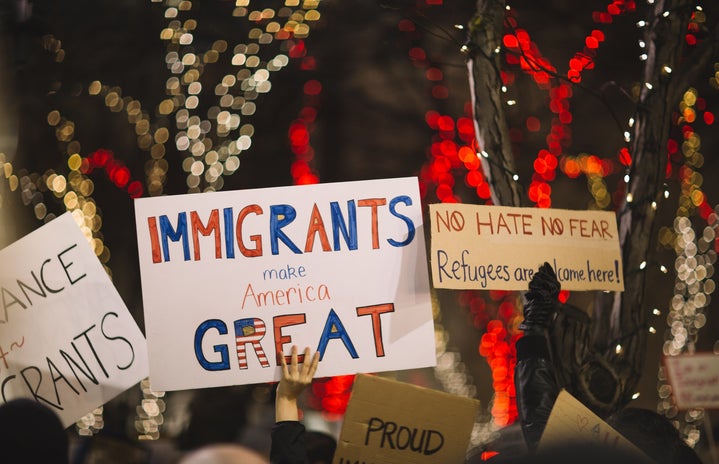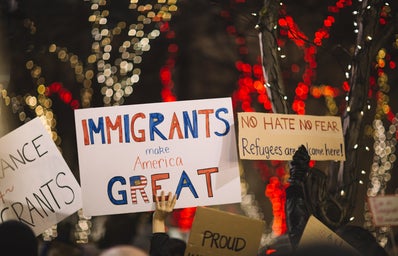This article contains spoilers up to episode four of The Falcon and the Winter Soldier.
Earlier this year, I, like many other Marvel fans, got sucked into the world of WandaVision. I laughed, I cried, I dove way too deep into fan theories. But when I saw advertisements for The Falcon and the Winter Soldier, I didn’t really feel any excitement. I figured I would get around to watching it eventually, but I assumed I wouldn’t be as into it as I was WandaVision. To be honest, Sam Wilson and Bucky Barnes have never been my favorite characters. It’s not that I didn’t like them; it’s that they never peaked my interest as much as other characters. I never felt a strong attachment to them; I never wanted to know more about them.
Then episode four aired. Online, Marvel fans were careful not to spoil anything, but one thing was made perfectly clear: people were horrified. I read people saying they felt physically sick watching it; others said they were shocked that Disney+ would air it. I couldn’t handle not knowing, and my best friend and partner swore they wouldn’t spoil anything for me. I had to know what happened, so I started the show and finished all four episodes in one night.
For those who may not know, in the Marvel comics, both Bucky and Sam become Captain America at some point. At the end of Avengers: Endgame, Steve Rogers leaves the shield to Sam Wilson. At the start of The Falcon and the Winter Soldier, Sam donates the shield to a museum because he doesn’t want to be Captain America. Bucky doesn’t understand this, and he’s pissed. In episode two, during an impromptu therapy session, Bucky tells Sam the reason it’s so important to him is because if Steve was wrong about Sam, that meant he might have been wrong about Bucky. What Bucky fails to see is that Sam is a Black man and a Black superhero in the United States of America. In the Marvel universe, Captain America has been the symbol for America since World War II. It’s not so simple for Sam to accept the shield, and therefore accept the responsibility and symbolism of the shield, because not everyone would accept him.

There are a ton of microaggressions thrown at Sam and other Black characters. Most of them are said by John Walker, the new Captain America. A couple memorable ones are when Walker asks Sam if he should put down the shield so their fight will be more fair. Walker constantly refers to Sam as Bucky’s partner, but the way he says it implies that Sam is Bucky’s sidekick. Viewers know that Bucky and Sam are equals; Walker thinks of them both as sidekicks to Captain America, but when they refuse to follow him, he assumes Bucky becomes the leader between the two of them. Then, there is the end to an amazing scene where Walker loses a fight to the Wakandan soldiers, the Dora Milaje. Anyone who has seen Black Panther knows how badass these women are, but honestly, it only takes watching that scene to know that they are incredibly skilled fighters. At the end of the fight, when one of the Dora Milaje stands over a defeated John Walker, holding Captain America’s shield, Ayo (another member of the Dora Milaje) tells her to leave it. The Dora Milaje leave, and Walker says, “They weren’t even super soldiers,” when asked if he’s okay. He had assumed it would be an easy win—his demeanor and a couple comments he makes at the beginning of the fight, including referring to their spears as “pointy sticks,” tell us that much. Walker is devastated that he lost a fight to a group of Black women because in his mind, they were never worthy opponents to begin with.
The irony of the racism playing out in the show is that it is replicated in the Marvel fandom as the show unfolds. Bucky is clearly the fan favorite between Sam and Bucky—whether people find him more attractive or more interesting, I don’t know. I am seeing posts asking that people appreciate all that Anthony Mackie (who plays Sam Wilson) brings to the show, because he is a co-lead and a truly amazing actor. But even putting aside that favoritism, fans were quick to villainize Ayo and the Dora Milaje when they attacked Bucky. At the start of episode four, we see that Ayo took the time to help Bucky free himself of the Winter Soldier. We can see in his expression how much that meant to him. Following the flashback, Ayo tells Bucky exactly how betrayed she, the Dora Milaje, and all of Wakanda feel that he helped Zemo escape from prison. This betrayal is clearly laid out, but fans seemed to ignore it completely. When the Dora Milaje later come to collect Zemo, Ayo stops and detaches Bucky’s vibranium arm. Fans immediately jumped to accuse Ayo of being ableist, completely ignoring the fact that Ayo told him he had eight hours before the Dora Milaje came to collect Zemo. The Falcon and the Winter Soldier shows us that John Walker will prefer the white hero over the Black hero every chance he gets; fans are showing that they will side with the white character over the Black one just the same.
Four minutes into the first episode, I sent my best friend a text that said, “I know they’re in the Captain America vein of Marvel, but can we please move past the villains being foreign, it doesn’t send a great message.” The Avengers have dealt with a lot of foreign villains, and sure, some of them are AI or aliens, but some of them are people, and those people are almost always foreigners. Because Marvel takes place in a fictional world adjacent to our own, viewers know how the past four years in our own world have looked. We know that white men in America who can’t control their temper are one of the biggest threats to us right now, not the foreigners we see in television shows. In The Falcon and the Winter Soldier, the Flag Smashers aren’t just some random (foreign) villains who want to make life harder for other people; they’re displaced people who found a place in the world when the blip occurred, and who are now demanding the same rights as the people who have come back after five years. The Flag Smashers aren’t evil. Even when Karli Morgenthau, the leader of the Flag Smashers, blows up a building with people still inside, her team is shocked and extremely upset. We can assume Karli isn’t a naturally violent person because her response is, “This is the only language these people understand.” This to me means if Karli had any other choice, she wouldn’t have hurt anyone. After all, her goal is to help the people who remained on Earth during the blip. She wants to keep them safe, but she also understands that she has to make a statement.
Of course, this violent act brings John Walker and his sidekick, Lemar Hoskins, to Latvia. Walker keeps trying to assert his dominance over Sam, Bucky, the Dora Milaje, and the Flag Smashers. In reality, none of them respect him, and therefore, none of them listen to anything he says. After a fight with the Flag Smashers, Karli throws Lemar into a wall, killing him. While John tries to wake him up, everyone else in the room runs out. John ends up following one of the Flag Smashers, demanding that he tell him where Karli is. When the man refuses, John uses Captain America’s shield to kill him. He rams the shield into the man’s body again and again, ignoring that bystanders have pulled out their phones to record the whole thing. When he’s done, John positions the shield back on his arm and smiles slightly.
I was shocked. This isn’t the most violent scene Marvel has ever shown, but I firmly believe it’s the most horrific. Fans were quick to point out this scene recalls one in Captain America: Civil War, where Steve Rogers tries to kill Tony Stark in the same way. Steve stops; John goes all the way. The final image of the episode being John standing with the bloodied shield and smiling makes a statement: the enemies may be foreign, but the evil is domestic. Captain America has symbolized the United States since World War II—John Walker now has that responsibility. And John Walker kills a man in cold blood, in front of dozens of people, with no care as to how many people will see the videos the immediate viewers took (the episode is appropriately called “The Whole World is Watching”). Four minutes into the first episode, I made an assumption they corrected in episode four. We can sympathize with the Flag Smashers—there is no way to sympathize with John Walker.
For the final two episodes, I can only hope someone will take the shield away from John. He doesn’t deserve it and he never has—Sam and Bucky are absolutely right to say that no one could ever replace Steve Rogers. The emphasis on how good Steve was is repeated throughout the episodes—and Sam mirrors it. Sam doesn’t want to be Captain America, so I don’t know if he’ll step into that role; still, I’m left hoping that Sam will be the one to take the shield away from John, and that the symbolism of what John did will seriously influence the role of Captain America in the future of the Marvel cinematic universe.



